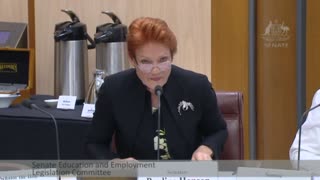Vaccine for Pregnancy & Kids - Australian Parliament - 27 April 2021 COVID-19 Hearing
Vaccine & Pregnancy, Baby-Defect Compensation, Vaccinating Kids, Herd Immunity, School-based vaccination programmes
Senator LAMBIE: I realise it’s only early days with the vaccine. We’ve obviously got pregnant women out there. What is the advice that cabinet or whatever is coming up with to vaccinate these women who are carrying babies? Are there any terms that they should be vaccinating them—at one month, two months or three months?
Dr Murphy : The ATAGI advice is that, at the moment, there’s no evidence that any of the vaccines have any adverse impact on pregnancy. There has been quite a bit of vaccination of people who turned out to be pregnant in the UK—people who didn’t know they were pregnant—and there’s been no evidence of what we call teratogenic or other adverse effects of the vaccine. But, in the absence of any specific studies in pregnant women, the advice has been that, at this stage, people should have a discussion with their doctor. I might ask Professor Skerritt to comment because he has the actual specific advice there, presumably, from the TGA.
Dr Skerritt : The specific advice from the TGA is that the safety and efficacy of the vaccine wasn’t assessed during clinical trials in pregnant women. However, people—for example, a nurse who may be working in an infectious diseases department or an emergency department—can choose and elect in consultation with their doctor to be vaccinated. There’s a very recent study that has been looked at in the US where they actually have looked at several hundred pregnancies and found no evidence of any birth defects or adverse outcomes on the pregnancy. We’re hoping that it will be published in the next couple of weeks. So, through the regulators’ grapevine, there’s a positive study—that was mainly with the Pfizer vaccine and the Moderna vaccine—showing that there are no adverse effects of the vaccination during pregnancy, and that’s really good news.
Dr Murphy : There are resources on our website, Senator Lambie, for any pregnant woman who seeks information, and for providers who want to look at the issue there’s significant information.
Senator LAMBIE: If that causes any defects or any issues when the baby is born, will they be covered with any sort of compensation?
Dr Murphy : There is, again, no evidence that that might be the case, but obviously—
Senator LAMBIE: That’s not what I asked you, Mr Murphy. I asked you: are they covered by a compensation system or scheme?
Dr Murphy : Obviously, if there were proven adverse effects from a vaccine, whether it was a birth defect or any other effect, there would be well-established avenues for getting compensation via our legal system, and, as you know, the Commonwealth has provided certain indemnities to the vaccine manufacturers to protect against that. So, yes, there are existing mechanisms if such a thing is proven, but there is no evidence that it’s the case.
Senator LAMBIE: I want to talk about children. We know that children can catch COVID-19—that’s now swinging back around—and that there are trials, but do we know if the vaccines are safe for young children? And to be protected will they need a vaccine?
Dr Murphy : I might get Professor Kelly to talk to that. There are trials being done at the moment in teenagers, who seem more commonly to get clinically evident COVID than younger children do. But the main reason to want to vaccinate children would be to create herd immunity. Very, very few children have clinically apparent COVID disease, and the very young children—primary school children—often don’t get the virus at all. It doesn’t seem to transmit very well. It does seem to transmit in older children, secondary-school-age children, and for that reason there are trials underway to make sure the vaccines are safe and effective. If they are safe and effective, we would probably, like most countries, want to embark on a program of vaccinating older children to create greater herd immunity to stop transmission. Professor Kelly might want to address that.
Prof. Kelly : I think it’s a very important component. Thank you for the question, Senator. For the reasons that Professor Murphy has mentioned, it’s not so much to protect the children, because we’ve found right around the world that that hasn’t been a major issue in terms of COVID—surprisingly; it’s very unusual for a respiratory infection like this to affect adults more than children, but that appears to be the case. It will be an important component of our vaccine rollout eventually. At the moment, there are trials, I believe—and Professor Skerritt will of course know more about these through his contacts internationally—down to the age of five—
Dr Skerritt : Five or six.
Prof. Kelly : five or six—for several of the vaccine candidates. So we look forward to those matters, but, at the moment, the TGA has approved only 18 and over for the AstraZeneca vaccine and 16 and over for the Pfizer vaccine, on the basis of the trial data that they’ve been presented with.
Dr Skerritt : But there is an expectation, in talking with some of the companies—and I’ve got to watch what I say because it’s commercial-in-confidence. Some of the companies that are already providing vaccines in Australia are expecting to submit regulatory data on children and adolescents later this year. That will give the Commonwealth the ability to decide whether or not to lower the age threshold. This is very common, for example, with the flu vaccines. The trials and data are originally generated in adults, and then later on adolescents and children are added to those trials.
Dr Murphy : There’s an important difference between flu and COVID, in that flu can be a very nasty disease in young children—
Dr Skerritt : For young children, yes.
Dr Murphy : and COVID is not a nasty disease in young children.
Dr Skerritt : But the general thing is that the very first trials you do with any vaccine are with healthy adults. For ethics reasons, they don’t round up a bunch of schoolkids to do those trials; they start with healthy adults over 18. As Professor Murphy said, flu is worse for children than COVID appears to be, as far as the symptoms.
Senator LAMBIE: Are you in discussions behind closed doors about getting herd immunity in our population if children aren’t vaccinated? Those under five or six. Is there any discussion on vaccinating them to get that herd immunity going?
Prof. Kelly : I might answer that. The issue of herd immunity is an important one to consider. It’s not an all or none phenomenon. The more people that are vaccinated, the more protection we have as a community. As you know, Senator, the vaccine rollout plan is based very much on vaccinating the vulnerable communities first and then working through the wider community. It’s true that the proportion of the Australian community who are at a younger age, who currently can’t be vaccinated and haven’t, in general, been exposed to the virus, could be a pool to recreate outbreaks in Australia, even if we’ve got a very high rate of vaccination within the adult community. So that is a matter; it’s a balancing act, again. Of course, we’re not going to start any vaccination program in children until we have that go-ahead from the TGA that it’s safe.
Senator LAMBIE: The question is: does anybody know whether we will be able to get herd immunity in our population if children are not vaccinated? Do we know that yet?
Prof. Kelly : We could, but it would require a very high rate of vaccination in adults. We need to get over 70 per cent to get herd immunity, and the higher, the better. With about 30 per cent of the population under the age of 18 in Australia, that would be difficult.
CHAIR: Would you need almost 100 per cent of the adult population to get to herd immunity without children?
Prof. Kelly : Correct.
Senator LAMBIE: The Pfizer and the AstraZeneca are approved for people over different ages: 16 for Pfizer and 18 for the AstraZeneca.
Dr Skerritt : Correct.
Senator LAMBIE: Are there any early results on whether certain vaccines are safer for children under the age of 10, five, or however you’d break it up? Is AstraZeneca less safe for children than the mRNA vaccines?
Dr Skerritt : Those studies, those trials, are still underway globally. Some of them have completed recruiting children and they’ve now vaccinated all of those kids. They’re waiting, obviously for a few months, to see whether there are differences in the vaccinated group of children versus the unvaccinated group of children or adolescents. As I indicated earlier, those trials will read out—we’ll get the results later in the year. There’s no evidence, for example, that one particular vaccine is more or less safe or effective in children than another vaccine. But, as more companies and clinical research groups are involved in those trials, we’ll be able to see the data, for example, for maybe three or even four vaccines by the end of the year.
Senator LAMBIE: Do children need to be vaccinated before we can open the borders and go back to living life more normally, or are we’re going to leave them out and just see what happens?
Prof. Kelly : As I mentioned in a previous answer, Senator, that is, in fact, the information that’s been sought and the advice that has been sought from the Australian Health Protection Principal Committee to the national cabinet—to decide about border and other opening matters. That’s work that’s currently underway.
CHAIR: So the level of vaccine deployment or the level of vaccination across the community will be a key component of that advice?
Prof. Kelly : I think it’s the absolutely most key part.
Senator LAMBIE: Have we got as far as asking if we have enough of the right vaccines to vaccinate our kids when it’s safe to do so? Do we have plans ready for a vaccine rollout for the kids? How would it work; or are we not that far yet?
Dr Murphy : Obviously we wouldn’t be using the AstraZeneca vaccine as a preference now for people under 50. But we have 40 million doses of the Pfizer vaccine coming, and eventually over 50 million doses of the Novavax vaccine coming later in the year. So we have plenty. There’s no suggestion that Novavax would have any age restrictions to it. We have plenty of vaccines on order to cover all of the Australian population twice over.
Senator LAMBIE: Have we got as far as the vaccine rollout for the kids? How would that work?
Dr Murphy : I think it’s a bit speculative at the moment until we have the evidence of safety and efficacy. But, in general, vaccine rollout to children is done through school based programs. They are the most effective way to get mass vaccination of children. The states and territories have a primary role in school based programs and are very experienced at them, and they’re very successful programs. So, if we got to that, that’s likely how we would do it, obviously supplementing it with general practitioners. It depends on the age range you’re talking about. If we eventually got down to quite young children, you might use other avenues. But, in the main, school based programs are the preferred option.
Ms Edwards : I can add that, in the vaccine rollout strategy since it was first announced in January, phase 3 has always envisaged the vaccination of children if and when a product is approved for that age. The age was recently reduced to under 16, subject to a new product, because the Pfizer vaccine is actually approved for people of 16 and above, and we have indicated that we would consider school based programs. But, of course, in regard to the logistics of what sort of vaccine it is and how it might be done, I’d expect we’d potentially be using all of the available mechanisms of vaccination for children, assuming that the product that’s approved for them in due course can be delivered through those mechanisms. So, yes, we have given some thought to it, but exactly how it would happen would depend on what happens in the meantime with an authorised product.
27 April 2021 COVID-19 Hearing
Full Video:
https://parlview.aph.gov.au/mediaPlayer.php?videoID=540409&operation_mode=parlview
-
 10:40
10:40
Australian Parliament Senate Committee Media Briefings
9 months agoSenator Hanson grills Pfizer Officials
186 -
 25:34
25:34
CarlCrusher
6 hours agoSecret Symbols of Skinwalker Ranch Territory - Part 7
1.24K5 -
 1:04:47
1:04:47
The Bitcoin Family
20 hours agoBITCOIN SUNDAY LIVE AMA DIDI TAIHUTTU
1.59K3 -
 LIVE
LIVE
Akademiks
6 hours agoDrake vs Kendrick Lamar. Who winning currently. Family Matters vs Not Like Us. Drake on Clock?
7,510 watching -
 LIVE
LIVE
SNEAKO
5 hours agoTHERE'S A LOT TO DISCUSS...
5,969 watching -
 59:42
59:42
The Late Kick with Josh Pate
11 hours agoLate Kick Live Ep 510: Bold Prediction Season | FSU vs Miami | G5 Perception vs Reality | A&M Future
25.4K5 -
 2:02:18
2:02:18
vivafrei
17 hours agoEp. 209: Trump Trial; Ole Miss; Pennsylvania Farmers; Owen Shroyer; Whitmer & MORE!
132K196 -
 1:27:31
1:27:31
RealitySurvival
7 hours agoPrepper SITREP: With Ethical Preparedness
48.1K5 -
 3:40:49
3:40:49
XrayGirl
13 hours agoGTFO | Sunday Funday with Kara Lynne, QBG and HeelvsBabyface
50.8K7 -
 2:16:20
2:16:20
George Galloway
2 days agoTHE FINAL COUNTDOWN - MOATS with George Galloway Ep 340
88.4K169